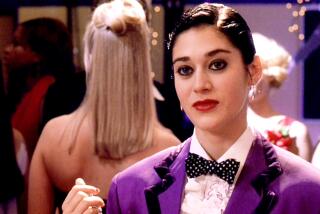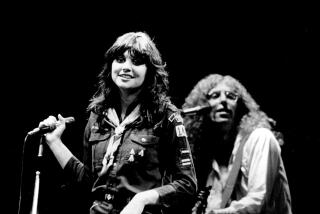Motown: old school but new cool
Talk about conflicting directives.
Enlisted to update music from the smash Broadway play “Dreamgirls” for its big-screen adaptation, the hit-making producer duo the Underdogs faced a daunting task. The musical’s songs, written in 1981 just after the zenith of the disco era, had to be overhauled to infiltrate the iPods of Generation Now, without alienating “Dreamgirls’ ” old-school fans.
For the record:
12:00 a.m. Feb. 21, 2007 For The Record
Los Angeles Times Wednesday February 21, 2007 Home Edition Main News Part A Page 2 National Desk 1 inches; 56 words Type of Material: Correction
‘Dreamgirls’ CD: An article in Tuesday’s Calendar about “Dreamgirls” music producers Harvey Mason Jr. and Damon Thomas said the soundtrack album recently was the lowest-selling No. 1 album in chart history. The album posted the lowest unit sales for a No. 1 album since the Nielsen SoundScan sales monitoring service began monitoring retail sales in 1991.
That meant maintaining the integrity of the musical’s period-specific sound -- with a twist.
Set in the mid-’60s to early ‘70s, “Dreamgirls” fictionalizes the career of Motown founder Berry Gordy Jr. and his management of Diana Ross as the breakout star of the Supremes, and many of its numbers convincingly replicate the Motown sound.
Nonetheless, the Underdogs (government names: Harvey Mason Jr. and Damon Thomas) had been hired to modernize “Dreamgirls’ ” girl-group harmonies, soaring show tune ballads and ‘70s soul for young fans more familiar with Three 6 Mafia than the Jackson 5. And if the producers failed, the drawing power of stars such as Beyonce, Eddie Murphy, Jennifer Hudson and Jamie Foxx would be for naught.
“We knew the songs and the time period, so that eliminated questions about what the style was going to be,” Mason said. “From there, our biggest challenge was to get that body of work to sound cool to today’s listeners.”
The Underdogs’ formula seems to have worked -- and then some. “Dreamgirls: Music From the Motion Picture” topped the national album chart last month, becoming the first soundtrack from a movie musical to claim the top spot since “Grease” in 1978 (although the accomplishment comes with an asterisk: “Dreamgirls” was also the lowest-selling No. 1 album in chart history).
Further, the music has resulted in an award season windfall, with “Listen,” a song performed by Beyonce that was composed by the singer and three other writers expressly for the film, winning a Broadcast Film Critics Assn. Critics’ Choice Award for best song. The film itself won for best soundtrack.
At the Golden Globes, “Dreamgirls” picked up a best musical or comedy statuette. And Murphy and Hudson, respectively, won Globes for best supporting actor and supporting actress -- for performances that effectively erase the line between acting and singing.
Leading into Sunday’s Academy Awards, Hudson and Murphy are in the running for supporting actress and actor Oscars. And “Dreamgirls” dominates the best song category with three of the five entries: “Listen”; the Hudson solo effort “Love You I Do”; and “Patience,” performed by Murphy, Keith Robertson and Anika Noni Rose.
But that’s all in a day’s work for the Underdogs. “Our motto is: Another day, another song,” said Thomas, seated behind the mixing board at the Underdogs’ studio complex, the Underlab, in Hollywood.
Over the 15 months it took to record the soundtrack, the producers adhered to the vision of director Bill Condon, working closely with the musical’s original composer, Henry Krieger, and the movie’s music supervisors, Matt Sullivan and Randy Spendlove, experimenting with synthesizers and electronic processing.
Ultimately, the Underdogs sidestepped much of the digital technology that has helped them create pop, hip-hop and R&B; hits for artists including Justin Timberlake, Mariah Carey, Tupac Shakur, Whitney Houston and a host of American Idols, relying on live instruments instead.
But the producers implemented one crucial building block of modern pop success that didn’t come into musical vogue until long after Motown’s ‘60s heyday: bass.
“Young listeners just want to hear 808,” said Thomas, referring to the Roland TR-808 programmable drum machine, whose bottom-heavy sound can be heard reverberating throughout most of today’s R&B; and hip-hop. “So the snares are really cracking, the kicks are really big and the low end is unlike any drums of the ‘70s. It’s not your standard Broadway sound.”
Nor your standard cast.
According to the producers, several “Dreamgirls” stars found inspiration for their characters behind the mike at the Underlab before going in front of the cameras. Chief among them Murphy. “When he came in, Eddie was unsure of what was going to happen, how we were going to work,” Thomas said. “To break the ice, he would sing -- as the donkey in ‘Shrek,’ as Stevie Wonder. Voices he did as jokes were how we were able to have him find that Jimmy Early character.”
“It was like, ‘Try singing James Brown,’ ” he continued. “He’d experiment and meld those characters to make his own.”
Spendlove, another of the soundtrack’s co-producers, was particularly struck by “American Idol” alumna Hudson’s in-studio transformation during the recording of “Dreamgirls’ ” emotional high point, “And I Am Telling You I’m Not Going.”
“It wasn’t just singing, it was acting,” he said. “It was the last piece of recording we did, this defining anthem in black culture. Jennifer carried that weight in. There were tears running down her face as she sang. [The character has] lost love, been kicked out of a band, her life is falling apart. And Jennifer was absolutely anchored in that moment.”
In all, 61 pieces of music were recorded for the film. “It was like making four or five albums at the same time,” Spendlove said. “Working as a team, we had four or five studios operating at any moment. You’d have live guitars in one, Eddie Murphy cutting a vocal in another, Harvey cutting vocals with Anika, with Damon adding the color -- he’s an incredible keyboard player.”
But on a recent afternoon, just hours after learning seven songs they produced for various artists had simultaneously cracked the Billboard pop singles chart, the Underdogs were in no mood to rest on their laurels.
In addition to a full slate of production work, front of mind for them is their Clive Davis-backed, J Records-distributed Underdog Entertainment record label, which will begin releasing recordings by Underdog-signed and -produced artists later this year.
Asked how an Oscar-winning song might affect their career outlook, Mason replied: “The only thing we think about is: How are we gonna make it to next year’s awards season?”
Thomas proceeded to finish the thought. “We’re trying to work and keep it going,” he said. “No celebrating for us right now.”
*
More to Read
The biggest entertainment stories
Get our big stories about Hollywood, film, television, music, arts, culture and more right in your inbox as soon as they publish.
You may occasionally receive promotional content from the Los Angeles Times.











